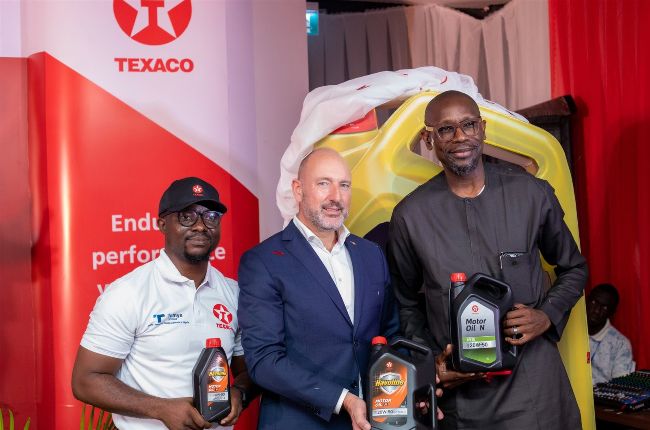LOCAL PRESENCE
Navigating Nigeria’s lubricants market: The case of Tethys Ltd
N
igeria is one of the major lubricant consumers in Africa, with a population of 223.8 million people as of 2023. Mordor Intelligence predicts that the Nigeria lubricants market size is estimated to be 553.40 million Liters in 2024 and it is expected to reach 597.33 million Liters by 2026, growing at a CAGR of 3.89% between 2024 and 2026.
>>Tethys Ltd is the exclusive brand licensee in Nigeria for Texaco lubricants produced by Chevron.
While the automotive industry is the largest lubricant user, power generation is becoming the fastest-growing segment due to the increasing use of natural gas and wind turbines for energy generation. To cater to the existing and growing demand for lubricants, the Nigerian market has many brands, ranging from international, regional, and local brands, that are working towards supplying lubricants.
The international brands present take the bigger share of the market, but regional and local companies have also cemented their position in the market and gained a customer base. For some international brands that don’t have subsidiaries in Nigeria or joint ventures with companies in the country, most of them use regional and local companies as their sole and official distributors to penetrate the market.
Such arrangements have been crucial in assisting most international brands to establish themselves in African markets. Such partnerships are a win-win situation for both companies as they complement and leverage each other’s strengths. For the local company, there is the strength of market knowledge and ease of penetration. For international brands, there are more resources and access to the latest technologies and high-quality products in the lubricants market, which makes it possible to gain clients in the African landscape.

From L-R: Habib Bello; Managing Director, Tethys Ltd, Jaap Jan Möhlmann; Manager, Distributor & Export Sales, Chevron and Doyin Ogun; Director, Tethys Ltd.
SOURCE | TETHYS LIMITED
Tethys Limited is one of such local companies that has carved out a place for itself in the Nigerian market. It is also the Brand Licensee of a major international lubricants brand.
Started in June 2020, Tethys Ltd is an indigenous sales and marketing company with a vision to establish itself as a dependable player in the downstream energy sector. Tethys aims to create a strong presence in the market, driven by a passion for continuous improvement, ethical business practices, and a deep understanding of its customers’ needs.
Tethys is the exclusive brand licensee in Nigeria for one of the major lubricant brands globally: Texaco lubricants produced by Chevron. This partnership allows Tethys to import, locally produce, market, and distribute Texaco-branded lubricants. Through this strategic collaboration, lubricants consumers in Nigeria, ranging from motorists to industries, now have access to a wide range of locally blended Texaco automotive and industrial lubricants under the Texaco, Havoline®, and Delo® brands. Some lubricants available include engine oils, transmission fluids, gear oils, greases, and hydraulic fluids.
The market segments served by Tethys with Texaco Lubricants are the Consumer, Commercial, and Industrial Markets. The Consumer Market comprises retail station outlets, lube kiosks, and lube bays. The commercial market includes distributors and resellers. The industrial market includes sectors like manufacturing, construction, oil and gas, and power generation, among others.
To ensure the quality of Texaco lubricants blended in Nigeria matches what Chevron blends, Tethys sources its base oils from local suppliers who import from refineries approved by Chevron. For the additives, they use Chevron Oronite’s additives from France.
Tethys currently operates and markets Texaco lubricants in Nigeria, and this market has its fair share of opportunities and challenges. The Nigerian lubricants industry presents opportunities such as a growing automotive sector, increasing industrialization, and with a large population, it translates into an increased demand for lubricants. Opportunities also abound in marine, agriculture, mining, and power generation industries.
Importing raw materials like base oils and additives for the Nigerian lubricants industry can present several setbacks, including exchange rate fluctuations, supply chain disruptions, tariffs/duties, and regulatory and compliance complexities. Other challenges include competition from multinational companies and infrastructural limitations.
Despite the obstacles in the market, it is encouraging to see indigenous companies like Tethys coming into play to cater to the market needs and position themselves as a trusted entity to be chosen as a Brand Licensee to a major brand. As the African continent continues to grow and as the demand for lubricants increases, it will be interesting to see local companies’ role in taking care of the market needs. Tethys is leading by example that these indigenous companies are the backbones of driving lubricant businesses in their respective countries.